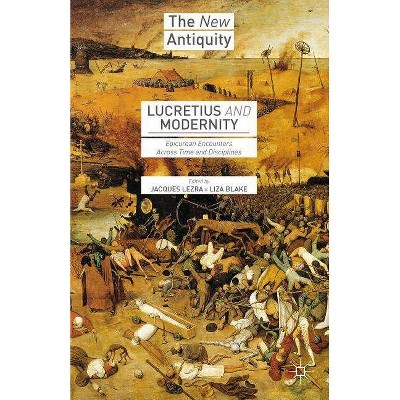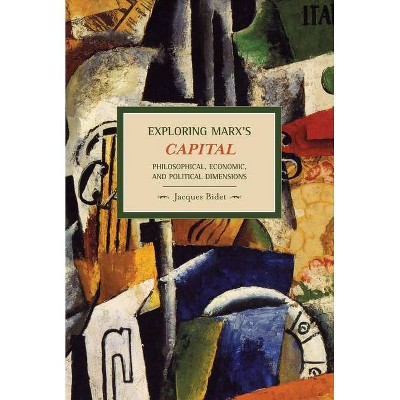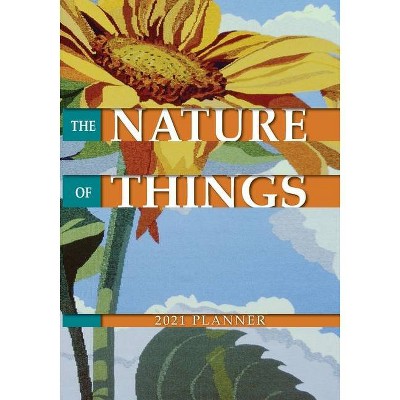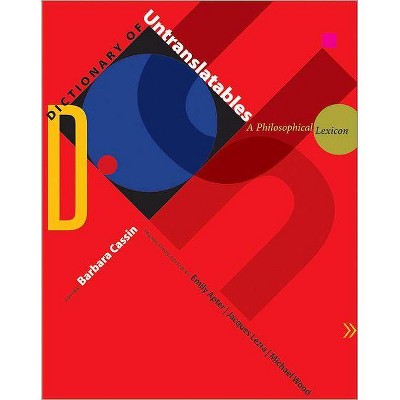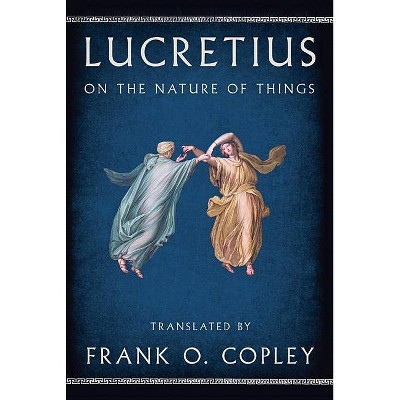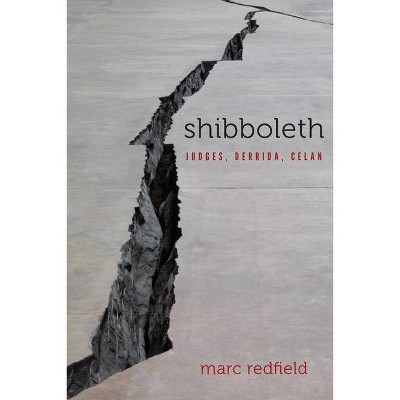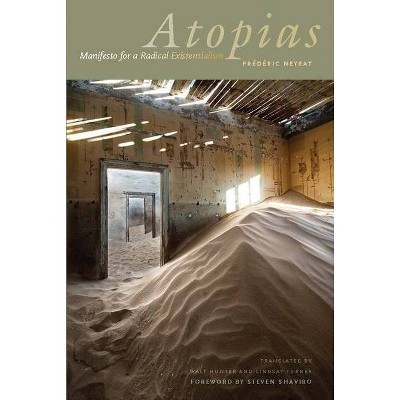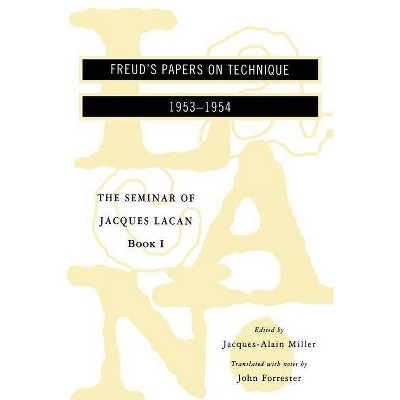On the Nature of Marx's Things - (Lit Z) by Jacques Lezra (Paperback)
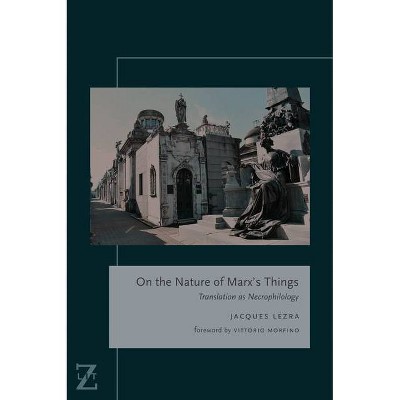
Similar Products
Products of same category from the store
AllProduct info
<p/><br></br><p><b> About the Book </b></p></br></br><i>On the Nature of Marx's Things</i> traces to Marx's earliest writings a Lucretian practice that Lezra calls necrophilological translation.<p/><br></br><p><b> Book Synopsis </b></p></br></br><p><i>On the Nature of Marx's Things</i> is a major rethinking of the Marxian tradition, one based not on fixed things but on the inextricable interrelation between the material world and our language for it. Lezra traces to Marx's earliest writings a subterranean, Lucretian practice that he calls necrophilological translation that continues to haunt Marx's inheritors. This Lucretian strain, requiring that we think materiality in non-self-evident ways, as dynamic, aleatory, and always marked by its relation to language, raises central questions about ontology, political economy, and reading. <p/>"Lezra," writes Vittorio Morfino in his preface, "transfers all of the power of the Althusserian encounter into his conception of translation." Lezra's expansive understanding of translation covers practices that put different natural and national languages into relation, often across periods, but also practices or mechanisms internal to each language. Obscured by later critical attention to the contradictory lexicons--of fetishism and of chrematistics--that <i>Capital</i> uses to describe how value accrues to commodities, and by the dialectical approach that's framed Marx's work since Engels sought to marry it to the natural philosophy of his time, necrophilological translation has a troubling, definitive influence in Marx's thought and in his wake. It entails a radical revision of what counts as translation, and wholly new ways of imagining what an object is, of what counts as matter, value, sovereignty, mediation, and even number. <p/>In <i>On the Nature of Marx's Things</i> a materialism "of the encounter," as recent criticism in the vein of the late Althusser calls it, encounters Marxological value-form theory, post-Schmittian divisible sovereignty, object-oriented-ontologies and the critique of correlationism, and philosophies of translation and untranslatability in debt to Quine, Cassin, and Derrida. The inheritors of the problems with which Marx grapples range from Spinoza's marranismo, through Melville's Bartleby, through the development of a previously unexplored Freudian political theology shaped by the revolutionary traditions of Schiller and Verdi, through Adorno's exilic antihumanism against Said's cosmopolitan humanism, through today's new materialisms. <p/>Ultimately, necrophilology draws the story of capital's capture of difference away from the story of capital's production of subjectivity. It affords concepts and procedures for dismantling the system of objects on which neoliberal capitalism stands: concrete, this-wordly things like commodities, but also such "objects" as debt traps, austerity programs, the marketization of risk; ideologies; the pedagogical, professional, legal, even familial institutions that produce and reproduce inequities today.</p><p/><br></br><p><b> From the Back Cover </b></p></br></br><p>"With impressive erudition and passion, Jacques Lezra returns to Marxian things to clarify some older debates and to make a fresh and welcome intervention in contemporary critical and literary theory. For Lezra, the term 'object' designates neither the mental object nor the material one but precisely the relation between them, a relation of translation that shows how objects produce new forms of knowing. Elaborating a 'necrophilology' that gives place to the structuring powers of loss, Lezra shows how critique requires the materiality of the poem as what is constantly rewrought to understand the process, the system, and the stuff of life."--Judith Butler, University of California, Berkeley <p/>"<i>On the Nature of Marx's Things</i> impressesevery minute, exhorting us to see the messianic contradictions not only of contemporary capitalism but of fetishism itself. Reading theoretically and aesthetically, historically and formally, Lezra provides us with a 'necrophilology' that tracks the 'costs of translation' when processes get represented as objects. A great, wild and precise, work of art."--Lauren Berlant, University of Chicago <p/>"Lezra's book makes ontology powerfully viable for, and by means of, the critique of contemporary capitalism. "--Antonio Negri <p/><i>On the Nature of Marx's Things</i> is a major rethinking of the Marxian tradition, one based not on fixed things but onthe inextricable interrelation between the material world and our language for it. Lezra traces to Marx's earliest writings a subterranean, Lucretian practice that he calls necrophilological translation that continues to haunt Marx'sinheritors. This Lucretian strain, requiring that we think materiality as dynamic, aleatory, and always marked by its relation to language, raises central questions about ontology, political economy, and reading. <p/><i>On the Nature of Marx's Things </i>draws the story of capital's capture of difference away from the story of capital's production of subjectivity. The book builds concepts and procedures for dismantling the system of objects on which neoliberal capitalism stands, whether concrete things like commodities, conceptual "objects" such as debt traps, austerity programs, and the marketization of risk, or the pedagogical, legal, even familial institutions that produce and reproduce inequities today. <p/>Jacques Lezra is Chair of Hispanic Studies at the University of California, Riverside.</p><p/><br></br><p><b> Review Quotes </b></p></br></br><br>Lezra's project is really to enrich our reception of Marx as a comprehensively cultural thinker, disrespecting the disciplinary boundary-lines of his time and ours.-- "Marx & Philosophy Review of Books"<br><br>"<i>On the Nature of Marx's Things</i> impresses every minute, exhorting us to see the messianic contradictions not only of contemporary capitalism but of fetishism itself, with its parade of objects that insist on establishing the general equivalency of unlike things. The 'thing' that matters to Lezra is therefore not stable but an occasion for playing out the dynamics of what's collectively held. Reading theoretically and aesthetically, historically and formally, he provides us with a 'necrophilology' that tracks the 'costs of translation' when processes get represented as objects or objects are said to substitute for each other. Adorno, Said, and Benjamin, the speculative realists, early modern drama and poetry, and a truly fantastic reading of "Bartleby's" translatability anchor us to engaging the set of rhetorical tropes and drives that enforce capitalist logics of general equivalence, creating false sovereignties and comforting relics. <i>On the Nature of Marx's Things</i> is a great, wild and precise, work of art."<b>---Lauren Berlant, University of Chicago, <i></i></b><br><br>"The project of returning 'Marxist logic' to a materialist and pragmatic approach has been underway for some years now. Jacques Lezra, plunging into this logic's deepest reaches, discovers there a 'language of things, ' exactly as in Lucretius; but also a language of singularities, as in Spinoza; and of differences, marshaled against the possibility of any system of general equivalences. What he calls 'necrophilology' intervenes wherever such systems would reinstall the fetishes of humanism to the heights from which they've been cast--as a rupture, a break. Is Lezra proposing an ontology? The word is heavy, but recalling Lucretius and Spinoza in this way certainly lightens its weight, and makes ontology powerfully viable for, and by means of, the critique of contemporary capitalism."<b>---Antonio Negri, <i></i></b><br><br>"With impressive erudition and passion, Jacques Lezra returns to Marxian things to clarify some older debates and to make a fresh and welcome intervention in contemporary critical and literary theory. For Lezra, both object-oriented ontology and new materialisms would do well to reread Marx on objects and things. They would find that the term 'object' designates neither the mental object nor the material one, but precisely the relation between them, and that this relation must be understood as a process of translation. Translation itself is no singular operation, acquiring new meanings in different historical situations, and offers a worthy alternative even to those tired versions of metaphysical identity that claim to be new. The book also shows that the very distinction between old and new materialism belongs to Marx's account of things. Translation offers insight into the very meaning of the social transformation of things and the ways that objects act to produce new forms of knowing. But whereas most readers of Marx end up valorizing either ideation or materialism, Lezra insists that there are ways out of these hierarchies and debates in primacy. Elaborating a notion of necrophilology that gives place to the vestige and the structuring powers of loss, Lezra shows us how critique requires the materiality of the poem as what is constantly rewrought to understand the process, the system, and the stuff of life."<b>---Judith Butler, University of California, Berkeley, <i></i></b><br><p/><br></br><p><b> About the Author </b></p></br></br><b>Jacques Lezra (Author) </b><br> Jacques Lezra is Professor and Chair of Hispanic Studies at the University of California, Riverside. His books include <i>Untranslating Machines: A Genealogy for the Ends of Global Thought</i>;<i> Wild Materialism: The Ethic of Terror and the Modern Republic</i> (translated into Spanish and Chinese); and <i>Unspeakable Subjects: The Genealogy of the Event in Early Modern Europe</i>. With Emily Apter and Michael Wood, he is the co-editor of Barbara Cassin's <i>Dictionary of Untranslatables</i>. <p/>
Price History
Price Archive shows prices from various stores, lets you see history and find the cheapest. There is no actual sale on the website. For all support, inquiry and suggestion messages communication@pricearchive.us

